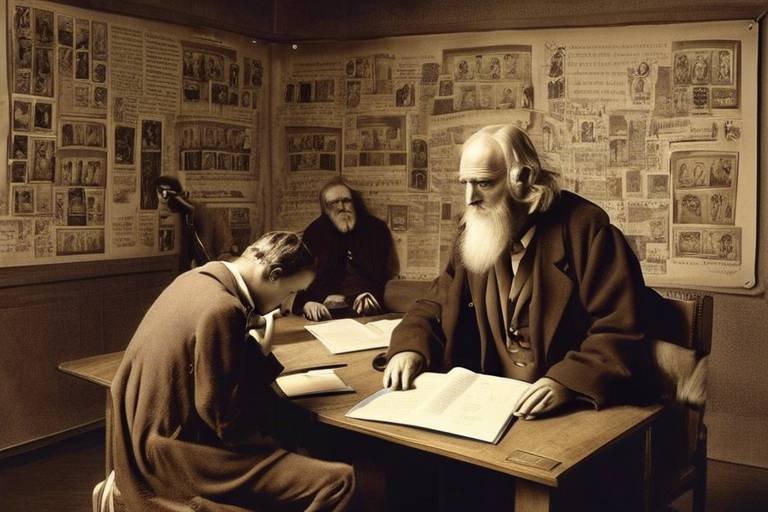How Did Ancient Philosophers Influence Modern Science?
The journey of scientific thought is akin to a winding river, shaped by the hands of ancient philosophers who dared to ask questions and seek understanding. Their profound influence is not merely a whisper in the corridors of history; it is a resounding echo that continues to resonate in the halls of modern science. As we delve into how these thinkers laid the groundwork for contemporary scientific inquiry, we discover that their ideas and methodologies are woven into the very fabric of our understanding of the universe.
Imagine a time when the world was shrouded in mystery, where the stars were mere pinpricks of light in a vast, uncharted sky. Ancient philosophers, with their insatiable curiosity and thirst for knowledge, began to peel back the layers of this mystery. They initiated the practice of questioning the natural world, observing phenomena, and seeking explanations beyond myth and superstition. This was the birth of scientific inquiry, a pivotal moment that set the stage for the rigorous methodologies we employ today.
As we explore the contributions of notable figures such as Aristotle, Plato, and Socrates, we uncover a treasure trove of ideas that shaped the trajectory of scientific thought through the ages. Each philosopher brought a unique perspective, enriching the dialogue around knowledge and the pursuit of truth. Their legacies are not relics of the past but living concepts that continue to inspire and challenge modern scientists.
Aristotle, for instance, emphasized observation and categorization, establishing a systematic method that encouraged future generations to engage in empirical research. His approach was revolutionary; he argued that knowledge should be derived from the world around us, not just from abstract reasoning. This empirical lens laid the foundation for what we now recognize as the scientific method, a structured approach to inquiry that prioritizes hypothesis, experimentation, and observation.
On the other hand, Plato's theory of forms introduced a more abstract way of thinking about reality and knowledge. His ideas bridged the gap between philosophy and empirical science, prompting future scientists to conceptualize theories and models that explain the complexities of the universe. Plato's influence reminds us that the pursuit of knowledge is not just about gathering data but also about understanding the underlying principles that govern our world.
Moreover, the Socratic method fostered critical thinking and dialogue, promoting a culture of inquiry that remains essential in scientific discourse and education today. By encouraging individuals to question assumptions and engage in meaningful discussions, Socrates laid the groundwork for a collaborative approach to knowledge acquisition. This spirit of inquiry is vital in modern science, where debate and dialogue drive innovation and discovery.
As we reflect on the influence of these ancient philosophers, it's clear that their methodologies were not merely academic exercises; they were the seeds from which the scientific method blossomed. The emphasis on hypothesis, experimentation, and observation became the cornerstones of scientific research, allowing humanity to unravel the mysteries of the universe in ways that were previously unimaginable.
In conclusion, the interplay between ethics, philosophy, and science is crucial in understanding the responsibilities that come with scientific inquiry. Ancient philosophers raised significant questions about morality and the impact of knowledge on society—issues that resonate deeply in contemporary discussions. Their legacy is a reminder that science is not an isolated endeavor; it is intertwined with the very fabric of human existence.
As we continue to advance in our understanding of the universe, we must remember the lessons imparted by these ancient thinkers. Their enduring legacy continues to shape modern scientific paradigms, inspiring ongoing debates about the nature of knowledge, reality, and our place in the cosmos.
- What is the significance of ancient philosophers in modern science?
Ancient philosophers laid the groundwork for scientific inquiry by introducing methods of observation, questioning, and critical thinking that are essential in today's scientific practices. - How did Aristotle influence the scientific method?
Aristotle emphasized empirical observation and categorization, which encouraged future scientists to develop systematic approaches to research and experimentation. - What role did Plato play in shaping scientific thought?
Plato's theory of forms provided a philosophical framework that influenced how scientists conceptualize theories and models, bridging the gap between abstract thought and empirical evidence. - How does the Socratic method relate to modern scientific discourse?
The Socratic method promotes critical thinking and dialogue, fostering an environment of inquiry that is essential for scientific debate and collaboration.

The Birth of Scientific Inquiry
In the grand tapestry of human thought, ancient philosophers are the weavers who first threaded the vibrant colors of inquiry and observation into the fabric of knowledge. Imagine a world where questions flowed freely, where the mysteries of nature were not just accepted but actively explored. This is the world that ancient philosophers like Aristotle, Plato, and others created. They sparked a revolution in thinking that laid the groundwork for what we now recognize as the scientific method.
At the heart of this transformation was the practice of questioning. Philosophers began to ask fundamental questions about the universe: What is the nature of reality? How do we know what we know? This shift from mythological explanations to rational inquiry marked the birth of scientific inquiry. They encouraged their students and followers to observe the world around them, leading to a systematic approach that prioritized evidence over speculation. It was a radical departure from the accepted norms of their time.
As we delve deeper into this era, we see that the methodologies developed by these thinkers were not merely academic exercises; they were practical tools for understanding the world. For instance, Aristotle’s emphasis on empirical observation and categorization set the stage for future generations. He believed that knowledge comes from experience and that one must observe phenomena before drawing conclusions. This idea resonates with modern scientific practices, where observation is the first step in the research process.
Furthermore, the philosophers’ focus on reasoning and logic established a framework that would guide scientific inquiry for centuries. They understood that to unravel the complexities of the universe, one must engage in rigorous debate and critical thinking. This intellectual environment fostered a culture of inquiry that encouraged questioning established beliefs and seeking new truths. It’s akin to planting seeds in fertile soil; the ideas of these ancient thinkers sprouted and flourished, eventually leading to the scientific breakthroughs we enjoy today.
In essence, the birth of scientific inquiry was not just about accumulating knowledge; it was about cultivating a mindset. This mindset is characterized by curiosity, skepticism, and a relentless pursuit of understanding. It invites us to look at the world not just as it is but as it could be understood through exploration and experimentation. The legacy of these early philosophers is a testament to the power of inquiry, reminding us that the quest for knowledge is a journey, not a destination.

Key Philosophers and Their Contributions
When we think about the roots of modern science, we can't overlook the profound impact of ancient philosophers. These thinkers were not just scribes of their time; they were the architects of inquiry, laying down principles that continue to guide scientific exploration today. Let's dive into the contributions of some of the most influential philosophers, including Aristotle, Plato, and Socrates, to understand how their ideas shaped the very fabric of scientific thought.
First up is Aristotle, a giant in the realm of philosophy and science. He was a true pioneer of the empirical approach, advocating for the systematic observation and categorization of the natural world. Imagine being in a time when knowledge was more about speculation than observation—Aristotle turned that notion on its head. His method of collecting data and analyzing it laid the groundwork for what we now recognize as the scientific method. He didn't just theorize; he observed the world around him, from the behavior of animals to the movement of celestial bodies, and categorized them in a way that was revolutionary for his time. This empirical approach encouraged future generations to rely on observation as a cornerstone of scientific research.
Next, we have Plato, whose contributions, though more abstract, were equally significant. His theory of forms posited that the material world is just a shadow of a higher reality made up of perfect forms or ideas. This concept influenced how future scientists conceptualized theories and models. Think of it as laying the groundwork for the idea that there is often more to reality than meets the eye. Plato's emphasis on the importance of ideas helped bridge the gap between philosophical thought and empirical science, encouraging scientists to look beyond mere observations to understand the underlying principles that govern the universe.
Then there's the legendary Socrates, whose method of inquiry remains a staple in education and scientific discourse today. The Socratic method—a form of cooperative argumentative dialogue—fosters critical thinking and encourages individuals to question their assumptions. It’s like peeling an onion; each question leads to another layer of understanding, pushing deeper into the essence of a topic. This method not only promotes a culture of inquiry but also inspires scientists to challenge prevailing ideas and seek deeper truths. Socrates taught us that asking the right questions can be just as important as finding the answers.
In summary, the contributions of these key philosophers were not isolated incidents; they created a ripple effect that shaped the trajectory of scientific thought through the ages. Their ideas fostered a culture of inquiry that emphasized observation, critical thinking, and the exploration of abstract concepts, all of which are crucial to modern scientific methodologies. As we continue to explore the universe, it’s essential to recognize the foundational ideas laid down by these ancient thinkers, reminding us that the quest for knowledge is a journey that spans centuries.
- How did ancient philosophers influence modern scientific methods?
Ancient philosophers introduced the practice of observation and critical questioning, which are fundamental to the scientific method used today.
- What role did Aristotle play in the development of science?
Aristotle emphasized empirical research and systematic categorization, laying the groundwork for future scientific inquiry.
- How did Plato's ideas contribute to scientific thought?
Plato's theory of forms encouraged scientists to look beyond surface observations to understand deeper principles governing reality.
- What is the Socratic method, and why is it important?
The Socratic method promotes critical thinking through dialogue and questioning, essential for scientific discourse and education.

Aristotle's Empirical Approach
When we think about the roots of modern science, Aristotle's name inevitably comes to mind. His approach was revolutionary, as he championed the idea of empirical observation—a method that encourages us to look at the world around us, gather data, and draw conclusions based on what we see. This was quite a departure from the abstract reasoning that had dominated philosophical thought before him. Aristotle believed that knowledge should be grounded in the physical world, and he meticulously categorized living organisms and natural phenomena, laying the groundwork for future scientific classifications.
Aristotle's method can be likened to a detective gathering clues at a crime scene. Just as a detective observes, collects evidence, and constructs a narrative based on tangible facts, Aristotle insisted that knowledge should be derived from direct observation and experience. This empirical approach made him a pioneer in the field of natural sciences, influencing countless generations of scientists who followed. His commitment to observation and categorization is reflected in his works, where he meticulously documented his findings on various subjects, from biology to physics.
One of the most significant aspects of Aristotle's empirical approach is his emphasis on systematic methodology. He didn't just observe; he analyzed and classified. For instance, he developed a system of categorizing animals based on their characteristics, which can be seen as an early form of taxonomy. His work in biology, particularly, was groundbreaking, as he was one of the first to classify animals into groups based on shared features. This systematic approach is a hallmark of scientific inquiry today, as we continue to rely on classification systems to understand the natural world.
Moreover, Aristotle's influence extends beyond biology. His work laid the foundation for various fields, including physics and ethics. He proposed that everything in nature has a purpose or final cause, which sparked debates that continue to this day. This idea encourages scientists to not only ask "how" things happen but also "why," fostering a deeper understanding of the universe. In this way, Aristotle's empirical approach was not just about observation; it was about seeking a comprehensive understanding of the world.
In summary, Aristotle's empirical approach is a cornerstone of modern scientific thought. His insistence on observation, categorization, and systematic analysis transformed the way we engage with the natural world. By laying the groundwork for empirical research, he encouraged future generations to adopt a similar mindset—one that values evidence over speculation. Aristotle's legacy is a testament to the power of observation in the quest for knowledge, reminding us that the world is full of mysteries waiting to be uncovered.

Plato's Theory of Forms
Plato's Theory of Forms is one of those fascinating philosophical concepts that can feel both abstract and deeply relevant to our understanding of reality. Imagine, if you will, a world where everything you see is just a shadow of a more perfect version of itself. This is essentially what Plato proposed: that beyond our physical world lies a realm of ideal forms, which represent the true essence of all things. For instance, think of a beautiful chair. The chair you sit on is merely a reflection of the 'ideal chair' that exists in this abstract realm. Plato believed that these forms are unchanging and eternal, while the objects in our world are subject to decay and change.
In his dialogues, especially in "The Republic," Plato elaborates on this theory, arguing that knowledge derived from sensory experience is inferior to knowledge gained through intellectual reasoning. This perspective laid the groundwork for future scientific thought by encouraging a distinction between the tangible world and the realm of ideas. By prioritizing the pursuit of these ideal forms, Plato pushed thinkers to conceptualize theories and models in a way that transcended mere observation. This shift in thinking is crucial for the development of scientific inquiry.
Plato's influence extends beyond mere abstraction; it also invites us to consider the implications of our understanding of reality. For example, when scientists create models to explain natural phenomena, they are, in a way, echoing Plato's idea of striving for the ideal. These models may not perfectly represent the complex nature of the universe, but they serve as our best approximations. This quest for understanding is a direct lineage from Plato’s philosophical inquiries.
In contemporary discussions, the Theory of Forms raises intriguing questions about how we perceive reality. Are our scientific models merely reflections of a deeper truth, or do they create their own forms of understanding? This interplay between philosophy and science encourages a dialogue that remains vital today. As we grapple with complex scientific concepts, Plato's insights remind us that there is often more to explore beneath the surface of what we can see and measure.
Ultimately, Plato's Theory of Forms challenges us to look beyond the physical and to consider the underlying principles that govern our understanding of the universe. It invites a richer exploration of knowledge, pushing the boundaries of what we consider real and urging us to seek out the essence of things. This philosophical framework not only informs scientific thought but also enriches our quest for knowledge, making it an enduring legacy that continues to resonate in modern discussions.

Socratic Method and Critical Thinking
The Socratic Method, named after the ancient Greek philosopher Socrates, is a powerful tool that promotes critical thinking and dialogue. Imagine sitting in a classroom, where the teacher doesn’t just lecture but instead asks probing questions that compel students to think deeply about their beliefs and assumptions. This method is not just about finding answers; it’s about the journey of inquiry itself. Socrates believed that through questioning, individuals could uncover their own understanding and, in turn, develop a more profound grasp of complex concepts.
At its core, the Socratic Method challenges participants to engage in a dialogue that reveals contradictions in their thoughts. For instance, when discussing a concept like justice, Socrates would ask, "What is justice?" followed by a series of questions that would lead his interlocutor to reconsider their initial definition. This process helps to illuminate the nuances of ideas and encourages a mindset open to exploration and reconsideration. It’s like peeling an onion—each layer of inquiry reveals something new, often leading to more questions than answers.
In the realm of modern science, the Socratic Method remains crucial. Scientists are often faced with complex problems that require innovative solutions. By fostering an environment where questioning is encouraged, scientists can collaboratively explore ideas, challenge assumptions, and ultimately drive discovery. This method not only enhances understanding but also cultivates a culture of intellectual humility, where individuals recognize that they do not have all the answers and are open to learning from others.
Moreover, the impact of the Socratic Method extends beyond the scientific community. In various fields such as law, education, and even business, critical thinking is essential. Professionals who employ this method are better equipped to analyze situations, make informed decisions, and engage in constructive debates. It’s a skill set that’s invaluable in today’s world, where information is abundant, but critical analysis is often lacking.
To illustrate the significance of the Socratic Method, consider the following table that outlines its key components and their relevance to critical thinking:
| Component | Description | Relevance to Critical Thinking |
|---|---|---|
| Questioning | Asking open-ended questions to stimulate thought | Encourages exploration of ideas and beliefs |
| Dialogue | Engaging in conversation to uncover deeper understanding | Promotes collaboration and diverse perspectives |
| Reflection | Taking time to consider responses and implications | Enhances self-awareness and critical evaluation |
| Challenge | Encouraging participants to defend their viewpoints | Fosters resilience and adaptability in thinking |
In conclusion, the Socratic Method is more than just a teaching technique; it’s a fundamental approach to cultivating critical thinking skills that are essential in both scientific and everyday contexts. By embracing this method, we not only honor the legacy of Socrates but also equip ourselves with the tools necessary to navigate an increasingly complex world.
- What is the Socratic Method?
The Socratic Method is a form of cooperative argumentative dialogue that stimulates critical thinking through asking and answering questions. - How does the Socratic Method apply to science?
It encourages scientists to question assumptions and explore ideas collaboratively, leading to deeper understanding and innovation. - Can the Socratic Method be used in everyday life?
Absolutely! It can enhance discussions in various fields, including education, law, and business, by promoting critical analysis and open dialogue.

Influence on Scientific Methodology
The influence of ancient philosophers on scientific methodology is nothing short of revolutionary. These thinkers laid the groundwork for the structured approach to inquiry that we recognize today. Imagine a world where questions about nature were met with skepticism rather than curiosity; this was the reality before the likes of Aristotle and Plato stepped onto the intellectual stage. They championed the idea that knowledge should not be accepted blindly but should be pursued through rigorous questioning and systematic observation.
At the heart of this evolution was the establishment of what we now refer to as the scientific method. This method is essentially a cycle of observation, hypothesis formation, experimentation, and analysis. Each step is critical, and it’s fascinating to see how ancient philosophies contributed to each of these components. For instance, Aristotle’s emphasis on observation was not just about looking; it was about looking with intent and purpose. He believed that through careful observation, one could categorize and understand the natural world. This idea resonates strongly with modern scientific practices where data collection and analysis are paramount.
Moreover, the ancient philosophers encouraged a culture of skepticism and inquiry. They posed questions that challenged existing beliefs, which is a fundamental aspect of the scientific method. This is where the Socratic method shines, promoting dialogue and debate as tools for uncovering deeper truths. By asking probing questions, Socrates taught his students to think critically about their assumptions, a practice that is still vital in scientific research today.
To illustrate the key components of scientific methodology influenced by ancient thought, let’s take a look at the following table:
| Component | Influence from Ancient Philosophy |
|---|---|
| Observation | Aristotle's empirical approach emphasized careful observation of natural phenomena. |
| Hypothesis | Philosophers like Plato encouraged the formation of abstract theories to explain observed realities. |
| Experimentation | The systematic investigation of ideas was pioneered by the early philosophers through practical applications. |
| Analysis | Socratic questioning promoted critical thinking, enabling a deeper analysis of results and theories. |
In addition to these components, the philosophical exploration of ethics and morality has also woven itself into the fabric of scientific methodology. Ancient philosophers raised profound questions about the implications of knowledge and the responsibilities of those who seek it. For example, what happens when scientific inquiry clashes with ethical considerations? This dialogue has evolved, but its roots can be traced back to the ancient thinkers who grappled with similar dilemmas.
In conclusion, the influence of ancient philosophers on the scientific method cannot be overstated. Their ideas about observation, critical thinking, and ethical inquiry have shaped a methodology that not only seeks to understand the universe but also to do so responsibly. The legacy of these thinkers continues to inspire scientists today, reminding us that every experiment, every theory, and every discovery is built upon the intellectual foundations laid centuries ago.
- How did ancient philosophers contribute to the scientific method?
Ancient philosophers like Aristotle and Socrates emphasized observation, critical thinking, and ethical inquiry, which are foundational elements of the scientific method. - What is the scientific method?
The scientific method is a systematic approach to inquiry that involves observation, hypothesis formation, experimentation, and analysis. - Why is ethics important in science?
Ethics is crucial in science as it guides researchers in making responsible decisions that consider the implications of their work on society and the environment.

Ethics and Philosophy in Science
When we think about science, we often imagine labs filled with beakers, complex equations, and groundbreaking discoveries. However, there’s a crucial layer that underpins all of this: ethics and philosophy. Ancient philosophers, like the wise Socrates and the analytical Aristotle, didn’t just ponder the nature of existence; they also raised profound questions about morality and the responsibilities of those who seek knowledge. Their inquiries laid the groundwork for ethical considerations in scientific practices that we still grapple with today.
Imagine a world where science operates without a moral compass. It would be akin to sailing a ship without a rudder—directionless and potentially dangerous. The ancient philosophers understood that knowledge comes with responsibilities. They challenged us to consider not just what we can do with our discoveries, but what we should do. This line of thinking is essential in modern science, especially when we face dilemmas such as genetic engineering, artificial intelligence, and environmental sustainability.
For instance, take the concept of natural rights discussed by philosophers like John Locke. His ideas about individual rights and the social contract have permeated scientific ethics, particularly in fields like medical research. Today, informed consent is a fundamental principle, ensuring that participants in studies understand their rights and the implications of their involvement. This ethical framework encourages scientists to respect the autonomy of individuals, which is a direct echo of ancient philosophical thought.
Moreover, the intersection of ethics and science is not just theoretical; it manifests in practical applications. Consider the debate surrounding climate change. Ancient philosophers would urge us to reflect on our responsibilities to future generations and the planet. This ethical inquiry drives modern scientists to advocate for sustainable practices and environmental stewardship. It’s a reminder that the quest for knowledge should always be balanced with a commitment to the greater good.
In addition, the scientific community today often relies on established ethical guidelines to navigate complex issues. These guidelines are shaped by ongoing philosophical discussions about the implications of scientific advancement. For example, the principles of beneficence, non-maleficence, and justice are deeply rooted in philosophical ethics and are essential in clinical trials and research ethics. They guide scientists in making decisions that prioritize the welfare of individuals and communities, ensuring that the pursuit of knowledge does not come at a cost to humanity.
To further illustrate this relationship, let’s look at a table that highlights key ethical principles derived from ancient philosophical thought and their modern scientific applications:
| Philosophical Principle | Modern Scientific Application |
|---|---|
| Natural Rights | Informed Consent in Research |
| Social Responsibility | Sustainable Practices in Environmental Science |
| Ethical Inquiry | Guidelines for Clinical Trials |
| Critical Thinking | Peer Review Process |
In conclusion, the interplay between ethics, philosophy, and science is not just a relic of the past; it is a vibrant conversation that continues to evolve. As we navigate the complexities of modern scientific challenges, we must remember the foundational ideas set forth by ancient philosophers. Their insights remind us that the pursuit of knowledge should always be coupled with a commitment to ethical responsibility. After all, in the words of Socrates, “The unexamined life is not worth living.” In the same vein, an unexamined scientific endeavor may lead us down a perilous path.
- What is the role of ethics in scientific research? Ethics in scientific research ensures that studies are conducted responsibly, protecting the rights and welfare of participants.
- How did ancient philosophers influence modern ethics? Ancient philosophers raised fundamental questions about morality, which laid the groundwork for contemporary ethical frameworks in various fields, including science.
- Why is critical thinking important in science? Critical thinking fosters a culture of inquiry, allowing scientists to rigorously evaluate evidence and challenge assumptions, which is vital for advancing knowledge.

Natural Philosophy and Science
Natural philosophy, a term that might sound a bit antiquated, was essentially the precursor to what we now recognize as modern science. Imagine a time when the boundaries between philosophy and science were blurred, where thinkers like Aristotle and Plato roamed the earth, pondering the mysteries of the universe without the sophisticated tools we have today. In their quest for knowledge, these ancient philosophers sought to understand the fundamental principles governing nature, laying the groundwork for scientific exploration.
At its core, natural philosophy encompassed a wide range of disciplines, including physics, biology, and astronomy. This holistic approach meant that ancient thinkers didn't just focus on isolated phenomena; they were interested in the interconnectedness of all things. For instance, Aristotle's studies of the natural world involved meticulous observations of plants and animals, leading him to categorize living organisms in ways that would influence biology for centuries to come.
One of the most fascinating aspects of natural philosophy is how it encouraged a sense of wonder about the universe. Think about it: back then, the stars were not just distant suns; they were mysteries waiting to be unraveled. Philosophers like Plato proposed theories about the cosmos that, while not scientifically accurate by today's standards, sparked curiosity and debate. This culture of inquiry was crucial in fostering an environment where questions were encouraged, and exploration was celebrated.
Moreover, the methodologies developed during the era of natural philosophy laid the groundwork for the scientific method we know today. Early philosophers emphasized observation and rational thought, which are still key components of scientific research. They engaged in a form of reasoning that involved forming hypotheses based on observations—a practice that is at the heart of modern scientific inquiry. To illustrate this, let's look at a simple comparison:
| Natural Philosophy | Modern Science |
|---|---|
| Emphasis on observation and reasoning | Emphasis on observation, experimentation, and analysis |
| Holistic understanding of nature | Specialized fields of study |
| Theoretical exploration | Empirical validation of theories |
This table highlights the evolution from a philosophical framework to a more structured scientific approach, showing how ancient ideas have transformed into the methodologies we rely on today. The legacy of natural philosophy is evident in the way contemporary scientists approach their work, blending rigorous experimentation with the philosophical questions that drive their inquiries.
As we delve deeper into the relationship between natural philosophy and science, it becomes clear that the ancient quest for knowledge was not merely an academic exercise; it was a profound exploration of existence itself. The questions posed by these early thinkers about the nature of reality, causality, and the universe resonate even today, reminding us that the pursuit of knowledge is a timeless endeavor. In a world where science continues to advance at an unprecedented pace, the philosophical foundations laid by ancient scholars serve as a crucial reminder of the importance of asking 'why' alongside 'how.'
- What is natural philosophy? Natural philosophy is the study of nature and the physical universe that was prevalent before the development of modern science, encompassing areas such as physics and biology.
- How did ancient philosophers contribute to modern science? Ancient philosophers laid the groundwork for scientific inquiry by emphasizing observation, categorization, and rational thought, which are essential components of the scientific method today.
- Why is the relationship between philosophy and science important? The interplay between philosophy and science is crucial because it encourages critical thinking and helps frame the questions that guide scientific research.

Legacy of Ancient Thought
The legacy of ancient philosophical thought is not just a relic of the past; it is a vibrant thread woven into the very fabric of modern scientific inquiry. These early thinkers laid down principles that continue to resonate through the corridors of academia and research labs today. Their ideas about the nature of reality, the importance of observation, and the pursuit of knowledge have shaped the way we approach science and inquiry.
One of the most significant contributions of ancient philosophers is the concept of rationalism—the idea that reason is the primary source of knowledge. This notion paved the way for the scientific revolution, where empirical evidence began to take precedence over superstition and dogma. Thinkers like Aristotle and Plato encouraged their contemporaries to observe the world critically, leading to a culture of questioning that is essential in modern science.
Moreover, the ancient Greeks introduced the idea of natural philosophy, which sought to explain the universe through logical reasoning rather than mythological narratives. This approach not only influenced the development of various scientific disciplines but also instilled a sense of curiosity and wonder about the natural world. Today, we see echoes of this in the way scientists approach problems: with a sense of inquiry and a desire to understand the underlying principles governing phenomena.
In addition to their contributions to methodology, ancient philosophers also raised profound ethical questions about the implications of scientific discovery. For instance, the writings of Socrates encourage us to consider the moral ramifications of our actions, a theme that is increasingly relevant in today’s discussions on topics such as genetic engineering and artificial intelligence. The intersection of ethics and science continues to be a hotbed of debate, reminding us that knowledge comes with responsibility.
To better understand the impact of ancient thought on modern science, let’s consider the following table that highlights key ancient philosophers and their contributions:
| Philosopher | Key Contribution | Modern Relevance |
|---|---|---|
| Aristotle | Empirical observation and categorization | Foundation of the scientific method |
| Plato | Theory of Forms | Conceptual frameworks in scientific modeling |
| Socrates | Socratic method and critical thinking | Encouragement of dialogue and inquiry |
The enduring legacy of these thinkers is reflected in the way we structure our educational systems, emphasizing critical thinking, observation, and ethical considerations. The philosophical underpinnings established by ancient scholars have not only influenced the scientific method but also continue to inspire new generations of scientists and philosophers alike.
In conclusion, the legacy of ancient thought is a testament to the power of inquiry and reason. As we navigate the complexities of modern science, it is crucial to remember the foundations laid by those who came before us. Their insights remind us that the pursuit of knowledge is not just about discovery; it is about understanding our place in the universe and the responsibilities that come with it.
- How did ancient philosophers influence the scientific method?
Ancient philosophers like Aristotle emphasized observation and systematic reasoning, which are foundational elements of the scientific method we use today.
- What is the relevance of ethics in modern science?
Ethics, as discussed by ancient thinkers, remains crucial in guiding scientific research and ensuring that discoveries are made responsibly.
- Can we see the influence of ancient philosophy in today's scientific discussions?
Absolutely! The principles of critical thinking and inquiry fostered by ancient philosophers are essential in contemporary scientific debates and education.
Frequently Asked Questions
- How did ancient philosophers contribute to the scientific method?
Ancient philosophers like Aristotle and Plato laid the groundwork for the scientific method by emphasizing observation, categorization, and logical reasoning. Their methods encouraged future scientists to formulate hypotheses, conduct experiments, and analyze results, which are essential components of modern scientific inquiry.
- What role did Aristotle play in shaping scientific practices?
Aristotle was a pioneer of empirical observation. He believed in studying the natural world through direct observation and categorization, which influenced the way scientists approached research. His systematic methods provided a foundation that many later scientists built upon.
- Can you explain Plato's influence on modern science?
Plato introduced the Theory of Forms, which suggested that abstract concepts are more real than the physical world. This idea encouraged scientists to develop theories and models that explain reality beyond mere observation, bridging the gap between philosophical thought and empirical science.
- What is the Socratic method and how does it relate to science?
The Socratic method is a form of cooperative dialogue that promotes critical thinking through questioning. In science, this method fosters an environment of inquiry and debate, essential for developing new ideas and challenging existing theories.
- How do ethics and philosophy intersect with modern science?
Ethics and philosophy play a crucial role in guiding scientific inquiry. Ancient philosophers raised important questions about morality and the implications of scientific discoveries, which continue to resonate in contemporary discussions about the responsibilities of scientists and the impact of their work on society.
- What is natural philosophy and how does it relate to science today?
Natural philosophy is the precursor to modern science, encompassing various disciplines that sought to understand the universe. It laid the groundwork for scientific exploration by encouraging a philosophical approach to understanding natural phenomena, which still influences scientific thought today.
- Why is the legacy of ancient philosophers important for modern science?
The legacy of ancient philosophers is vital because their ideas continue to shape our understanding of knowledge, reality, and the universe. Their influence is evident in ongoing scientific debates and the methodologies employed in research today.



















